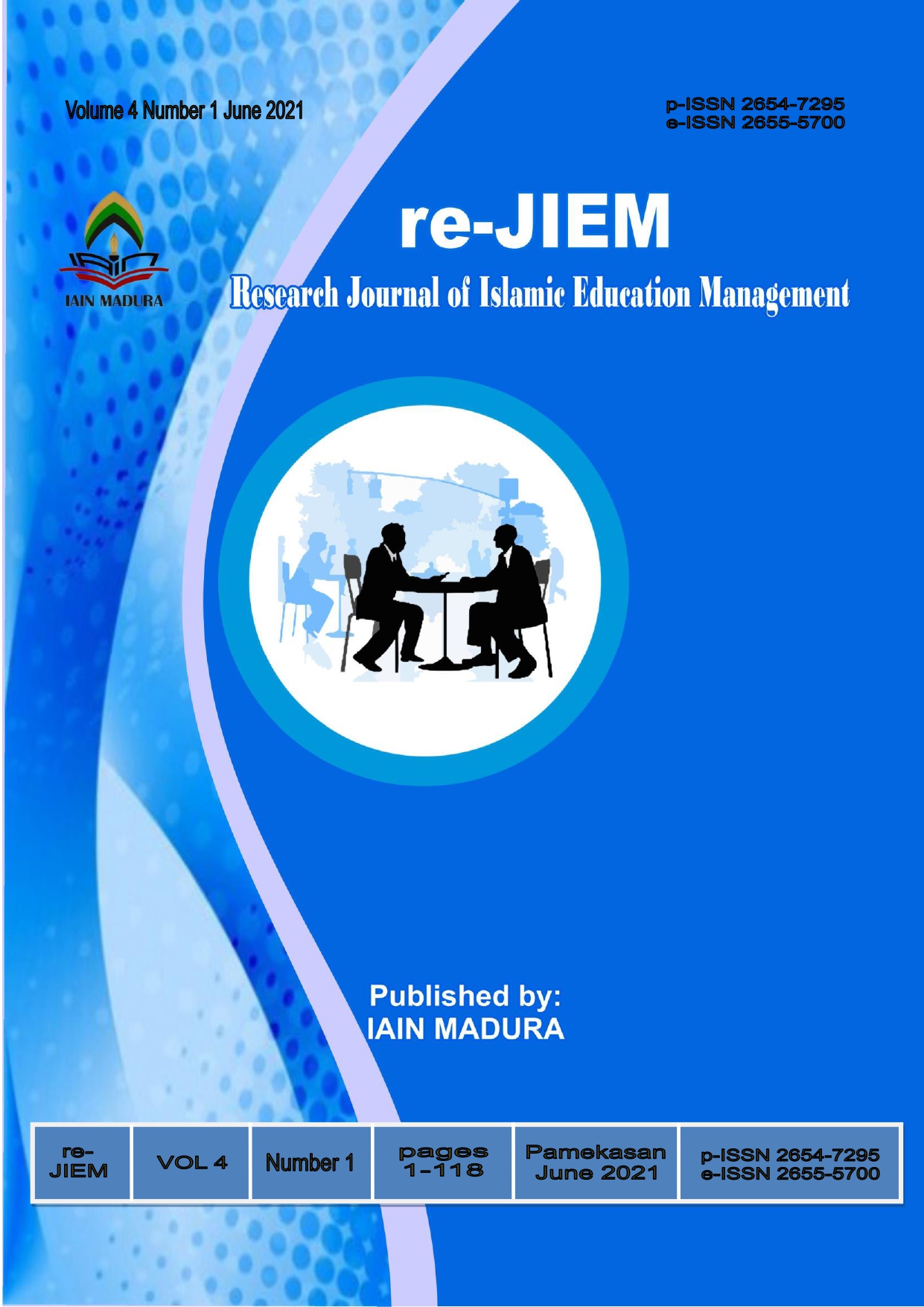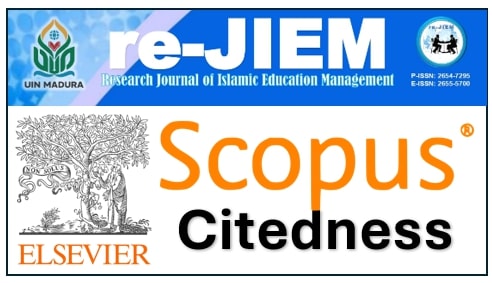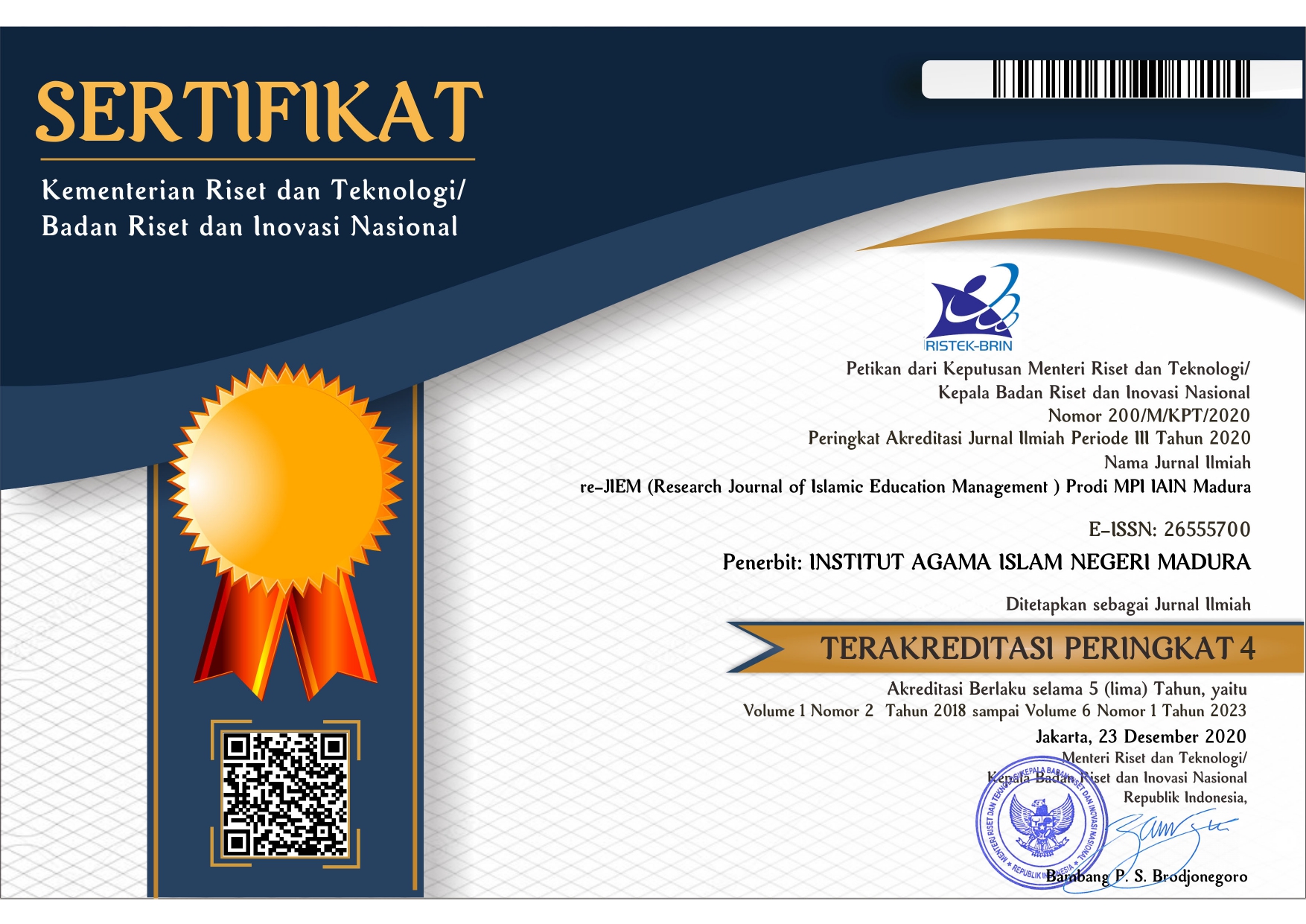IMPLEMENTASI MANAJEMEN SUMBER DAYA MANUSIA DALAM MENINGKATKAN MUTU PENDIDIKAN DI SEKOLAH MENENGAH KEJURUAN AL-FAQIH SUMBER NYAMPLONG PAMEKASAN
 Abstract views: 870
,
Abstract views: 870
,
 PDF downloads: 711
PDF downloads: 711
Abstract
This study aims to determine the implementation of human resource management in improving the quality of education and the factors that support the implementation of human resource management in improving the quality of education. This research was conducted at SMK Al-Faqih Sumber Nyamplong Kowel Pamekasan using a descriptive qualitative approach. The results of this study indicate that the implementation of Human Resource Management to Improve Education Quality has several stages including a) needs and information analysis, b) teacher recruitment, c) induction of new employees, d) teacher placement, e) granting authority and responsibility for staff, f) implementation of supervision, g) fostering teacher welfare, h) career development for employees, i) termination of relations, and j) severance pay. While the Supporting Factors are a) principals have many considerations, b) programs run in schools can bring positive changes and impacts, c) facilities and infrastructure can be utilized optimally, and d) evaluation.
Downloads
References
Arini, Robby, and Achmad Muhlis. “Manajemen Strategik Mutu Rekrutmen Tenaga Kependidikan Di Institut Agama Islam Negeri Madura.” Re-JIEM (Research Journal of Islamic Education Management) 3, no. 1 (2020): 29. https://doi.org/10.19105/re-jiem.v3i1.3485.
Barnawi, and M. Arifin. Manajemen Sarana & Prasarana Sekolah. Yogyakarta: Ar Ruzz Media, 2014.
Lukluk Isnaini, Rohmatun. “Implementasi Rekrutmen Guru Disd Ta’Mirul Islam Surakarta (Kajian Manajemen Sumber Daya Manusia Di Sd Islam).” Jurnal Pendidikan Agama Islam 12, no. 1 (2015): 109–20. https://doi.org/10.14421/jpai.2015.121-08.
Moleong, Lexy J. Metodologi Penelitian Kualitatif. Bandung: Remaja Rosdakarya, 2011.
Mutohar, Prim Masrokan. Anajemen Mutu Sekolah Strategi Peningkatan Mutu Dan Daya Saing Lembaga Pendidikan Islam. Yogyakarta: Ar Ruzz Media, 2013.
Purwanto, M. Ngalim. Administrasi Dan Supervisi Pendidikan. Bandung: Remaja Rosdakarya, 2010.
Rohiat. Manajemen Sekolah. Bandung: PT. Refika Aditama, 2010.
Sudarsana, I Ketut. “Peningkatan Mutu Pendidikan Luar Sekolah Dalam Upayapembangunan Sumber Daya Manusia.” Jurnal Penjaminan Mutu 1, no. 1 (2016): 1. https://doi.org/10.25078/jpm.v1i1.34.
Sukmadinata, Nana Syaodih, Ayi Novi Jami’at, and Ahman. Pengendalian Mutu Pendidikan Sekolah Menengah : Konsep, Prinsip, Dan Instrumen. Bandung: Refika Aditama, 2006.
Suparlan. Menjadi Guru Efektif. Yogyakarta: Hikayat Publishing, 2005.
Thoha, Mohammad. Manajemen Penddikan Islam Konseptual Dan Operasional. Surabaya: Salsabila Putra Pratama, 2016.
Wakiah, Maryatul, and Jamiludin Usman. “Manajemen Peningkatan Mutu Kompetensi Lulusan Bidang Kewirausahaan Dalam Memenuhi Standar Nasional Pendidikan Di Smk Annuqoyyah Guluk-Guluk Sumenep Jawa Timur.” Re-JIEM (Research Journal of Islamic Education Management) 3, no. 1 (2020): 71. https://doi.org/10.19105/re-jiem.v3i1.3517.
Wirawan. Evaluasi Kinerja Sumber Daya Manusia Teori, Aplikasi,Dan Penelitian. Jakarta: Selemba Empat, 2009.
Copyright (c) 2021 Ach. Nasrullah , Mohammad Muchlis Solichin

This work is licensed under a Creative Commons Attribution-ShareAlike 4.0 International License.
Authors who publish with this journal agree to the following terms:
Authors retain copyright and grant the journal the right of first publication with the work simultaneously licensed under a Creative Commons Attribution-ShareAlike 4.0 International License that allows others to copy and redistribute the material in any medium or format with an acknowledgment of the work's authorship and initial publication in this journal and also allows them to remix, transform, and build upon the material for any purpose, even commercially, with contributions under the same license as the original.
Authors are able to enter into separate, additional contractual arrangements for the non-exclusive distribution of the journal's published version of the work (e.g., post it to an institutional repository or publish it in a book), with an acknowledgment of its initial publication in this journal.
Authors are permitted and encouraged to post their work online (e.g., in institutional repositories or on their website) prior to and during the submission process, as it can lead to productive exchanges, as well as earlier and greater citation of published work.


























